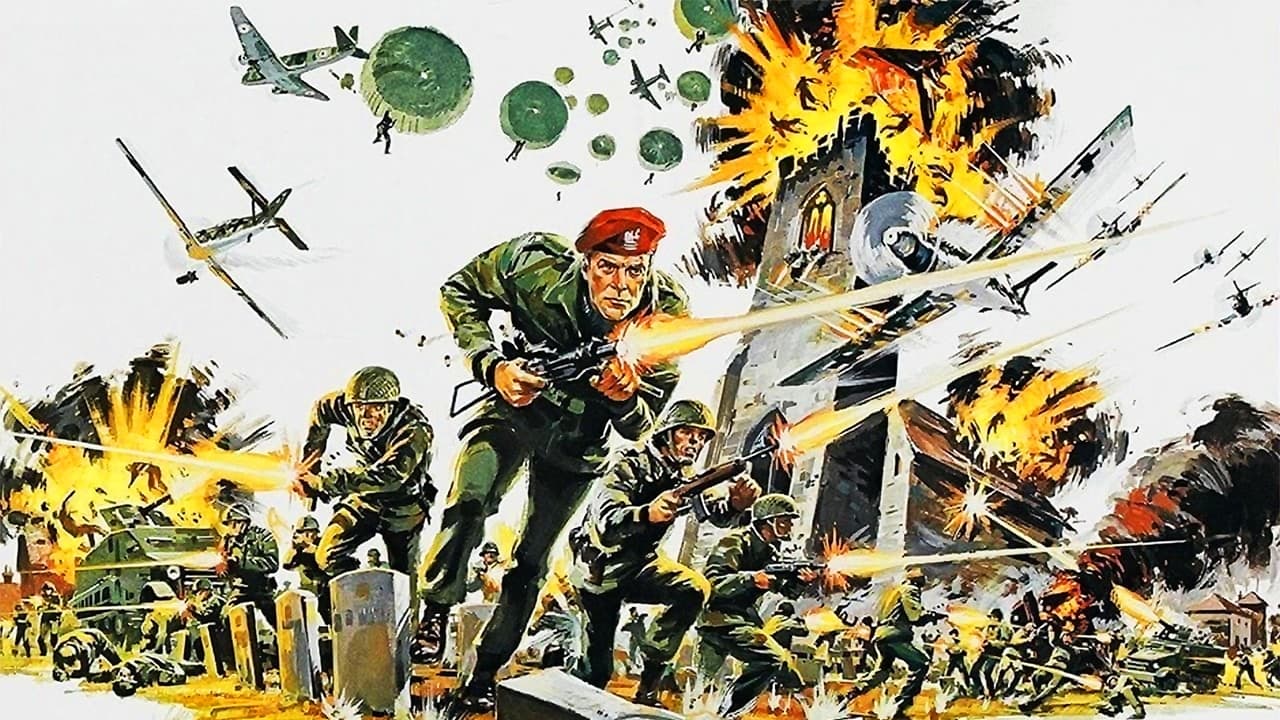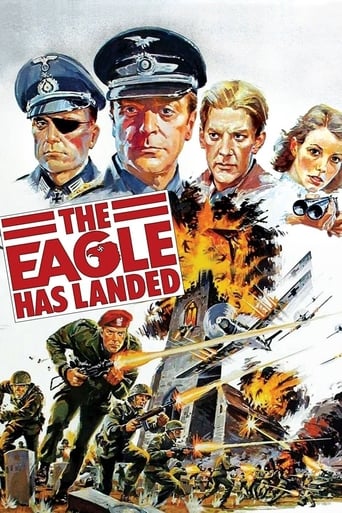

Terrible acting, screenplay and direction.
... View MoreSorry, this movie sucks
... View MoreReally Surprised!
... View MoreLet's be realistic.
... View MoreBecause he's upset the hard line Nazis of the S.S., paratroop commander Michael Caine and his men are sent on a suicide mission, to go to Great Britain and bring about the capture or death of Winston Churchill. The Nazis have intelligence that the Prime Minister will be on the coast inspecting fortifications and will be spending one night at a particular coastal village.The mission is to go in as Free Polish soldiers and take up residence in said coastal village. But ironically are given away by a random act of kindness by one of the Germans. After that Caine and his men are on their own.Ironically it's in English history that one finds a parallel for the predicament Caine is in. Sir Walter Raleigh under a death sentence, but the warrant unexecuted spent some 15 years in the Tower Of London until James I sent him on a mission to South America to find gold in the Orinoco River country of what is now Venezuela. No gold and Raleigh came back to face the ax. This was John Sturges's last action/adventure film and he put together a fine ensemble cast. English actors Anthony Quayle and Donald Pleasence play Admiral Carnaris and S.S. head Heinrich Himmler. John Standing is the village vicar, Treat Williams is American army captain, Jean Marsh is an enemy spy in the village and Judy Geeson is Standing's sister and a WREN. Standing out however in the cast is Donald Sutherland as a former IRA man who has gone over to the Nazis and he also is an enemy agent who gets a chance to fall in love with local Jenny Agutter. And Larry Hagman is a thick as a brick army colonel who blunders into the situation and bungles badly. the Gomer Pyle of colonels.Of course we know how this ends because history tells us Churchill was not assassinated. Or do you? You might be in for a surprise.
... View MoreBased on the 1975 novel of the same name by Jack Higgins, this is an extremely enjoyable "Boy's Own"-type adventure thriller concerning a Nazi plot to kidnap Churchill in 1943. I first saw the film in 2006 and I did not particularly enjoy it. I think that the major problem that I had with it then was that I was expecting it to be on the same level as the director John Sturges' previous films "The Magnificent Seven" and "The Great Escape", my fourth and fifth favourite films respectively then and now, and it most certainly isn't. However, I was unfair to it on that occasion. On my second viewing of it today, I enjoyed it considerably more for what it was as opposed to disliking it for what it wasn't. There was a few rather silly moments but it has a cracking script by Tom Mankiewicz. I would praise Sturges' direction from what I saw on screen but, according to Mankiewicz and Michael Caine, most of the editing work was done by Anne V. Coates so it is a little hard to gauge it in the way that I normally would for such things. This was Sturges' final film, incidentally.Michael Caine is characteristically excellent as the highly decorated but disgraced protagonist Oberst Kurt Steiner. He is introduced while trying to save a young Jewish woman from being rounded up by the SS in Poland, saying that he does not have any strong feelings about the Jews one way or the other but he has seen too many people die in the war already. Steiner is a comparatively honourable man who at times is even sympathetic in spite of the fact that he is leading the mission to kidnap the Prime Minister. In fact, most of his men are honourable as one of them gives his life to save a little English girl from being crushed by a waterwheel. He meets that unpleasant fate himself. His Free Polish uniform is torn and it is revealed that he is wearing a German one underneath and, consequently, that they are Germans. Steiner insisted that he and his men be allowed to wear their German uniforms, one of the aforementioned silly moments.I said in my review of "Ordinary People" last week that Donald Sutherland is one of the best actors of his generation and I stand by that. However, he was badly miscast as the Germans' IRA accomplice Liam Devlin. He does the best that he can with the role but his Irish accent is not great and the character is a little clichéd, his second line being "Top o' the mornin' to ya." Bar one year in Edinburgh, I have lived all of my 28 years in Ireland and I have yet to hear anyone say that unless they were mocking Irish stereotypes! Richard Harris was strongly considered for the role and he would certainly have been more suited to it as, aside from his nationality, he often played rough and ready characters. However, perhaps he was too suited to it. The producers decided that it was a bad idea to cast him since he was known for making pro-IRA statements in real life. Considering that this was a British film made in the 1970s, I don't think that it was a great idea or a very tasteful one to make Devlin a lovable rogue, essentially. His love story with Molly, admittedly played very well by Jenny Agutter, is nice but it doesn't really add much to the film.The film has a very strong supporting cast overall such as Robert Duvall as Oberst Radl, Anthony Quayle as the Cassandra-esque Admiral Wilhelm Canaris (who was executed for treason in 1945), a suitably creepy Donald Pleasence as Himmler, Jean Marsh as the sleeper agent Joanna Grey, Sven-Bertil Taube as Hans, John Standing as Father Verecker, a very young Treat Williams as Captain Clark, Michael Byrne as Karl, Siegfried Rauch (the most prominent German cast member) as Brandt and, last but not least, Larry Hagman as the blustering, buffoonish US Army Colonel Clarence E. Pitts. Interestingly, he played a somewhat similar character in his cameo in "Superman", likewise written by Mankiewicz. The film also features nice small appearances from Maurice Roëves, Judy Geeson, Jeff Conaway, Roy Marsden and Denis Lill.Overall, this is not a heavy hitter when it comes to World War II films but it's great fun. Oh, and what a twist at the end!
... View MoreGreat WW2 movie.Based on the Jack Higgins novel, the plot interesting and believable, despite being, on the surface, quite far-fetched. Ending is a bit tame though.All-star cast delivers in spades. Michael Caine in the lead role is superb, as always. Good support from Robert Duvall, Donald Sutherland, Donald Pleasance, Anthony Quayle, Treat Williams and Jenny Agutter. Larry Hagman overdoes the buffoonery though.A classic war-drama.
... View MoreI re watched this recently and its still good. The extended version DVD with the 11 minutes put back in is really much, much, better too. The idiots who cut this film down for TV should be sacked to prevent them committing similar crimes to other movies.Caine's acting is still incredibly subtle in places and each time you watch it you spot something new. Also brilliant are Jean Marsh, Treat Williams, Donald Sutherland and Robert Duval. Duval's character has cancer and winces as he walks in several scenes. Clearly he is clearly method acting the pain in his pauses.To those who have lambasted Larry Hagman's acting as Colonel Pitts - well I can say I have met officers this stupid in the army, and after seeing David Schwimmer's character, who was based on real life, in 'Band of Brothers' it appears idiots of this calibre really did get to battalion rank in the US Army in WW2. Larry is brilliant in this film and I enjoy his moments every time I watch it.
... View More